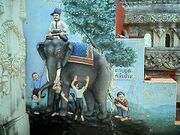In a recent post by Dan Bednarz in the online journal Health After Oil discusses the difficulty of engaging in rational debate when the participants operate from different paradigms and use different organizing metaphors to communicate. The post entitled “But You’ve Offered no Solutions,” is an illustration of Thomas Kuhn’s Incommensurability Thesis.
"Recently I spoke to a gathering of medical and public health students at Columbia University about the contribution the health sciences can make to Mayor Bloomberg’s PLANYC, a vision for a sustainable New Your City in 2030.
"Although I had prepared opening remarks on how I was speaking from a paradigm premised upon the end of the physical expansion of the economy, this discussion quickly became an example of Thomas Kuhn’s incommensurability thesis. This means that proponents of competing paradigms are prone to misunderstanding and misinterpretation and, overall, “talking past” one another as they find one another’s conceptual positions and policy recommendations incomprehensible or absurd." (more...)
I am mindful of the parable of the blind men and the elephant. The first blind man touches the elephant’s trunk

and believes it’s a snake. The second blind man touches the elephant’s leg and believes it is a tree trunk. The third touches the elephant’s side and believes it’s a wall. The fourth touches the elephant’s tail and thinks it’s a pig. A fifth touches the elephant’s ear and thinks it’s a fan. The sixth feels the tusk and believes it’s a knife. The question in this parable is “who’s right?”
The quick answer is that they’re all wrong – it’s an elephant after all. But we can only say that from the seventh vantage point of being able to see the whole picture, a vantage point we rarely, if ever, have in real life. From the position of any one of the blind men, whose blindness is a metaphor for the limited information we typically possess, who’s right? The correct answer is that they all are. Wisdom occurs when the blind men, recognizing their limitations, share their information. If they trust the validity of their separate experiences and share these experiences with each other, then the question for them then becomes: what can be a snake, a tree, a wall, a knife, a fan and a pig all at the same time. This is completely analogous to situations involving multiple community stakeholders who offer multiple insights and metaphors into an issue, none of which are complete. The challenge for any group of stakeholders or community builders, as it is for the blind men, is to find that larger reality where all of those smaller truths can remain valid at the same time.
The process of answering such questions is likely to engender both learning and experimentation. It will also require extensive trust among the participants that they are not being deceived. In the end, however, the blind men are more likely to uncover the truth of the elephant by sharing their experiences than by simply arguing who’s right. Where no one can lay claim to being right, no one can be ‘in charge’ -- a significant challenge for any modern day leaders.